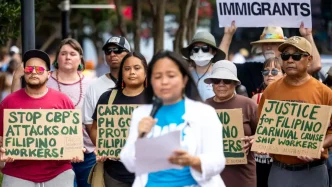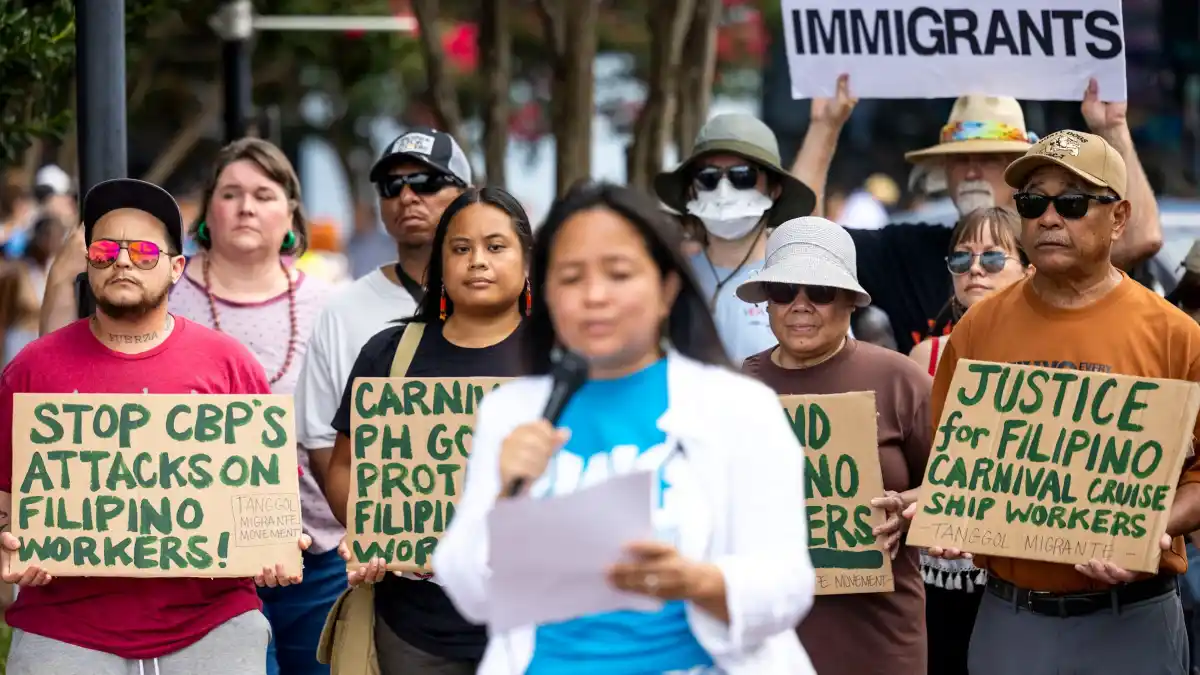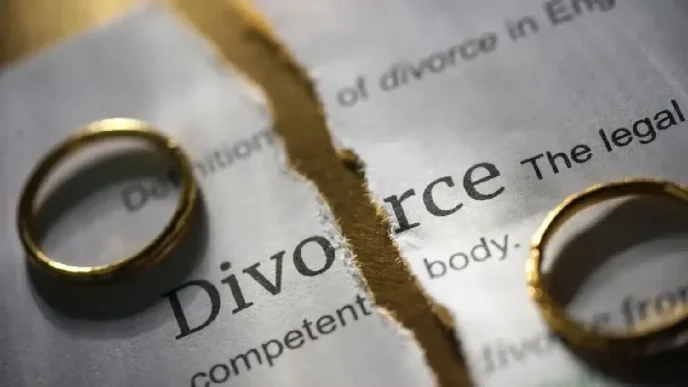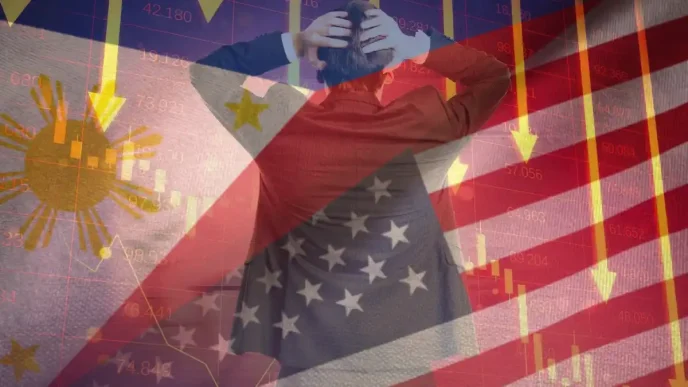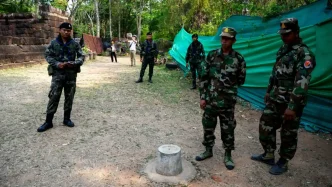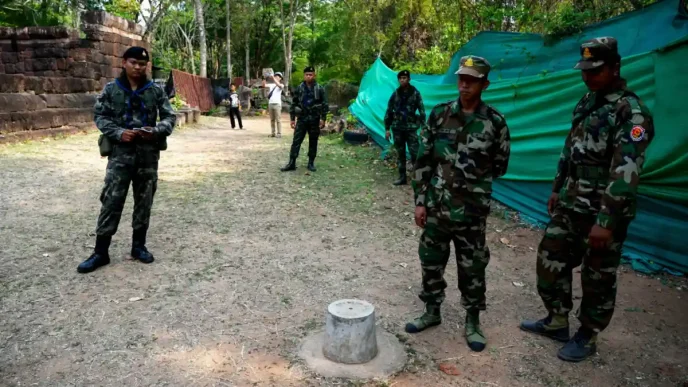In a deeply troubling incident, at least 18 Filipino workers were forcibly removed from a cruise ship docked at the Port of Norfolk in Virginia, deported to the Philippines, and banned from reentering the United States for 10 years. Community leaders have condemned the raid as an alarming escalation of harsh immigration practices, raising urgent questions about the treatment of migrant workers and the accountability of US authorities and corporate entities.
Details of the Norfolk Raid
The incident, which occurred recently aboard the Carnival Sunshine cruise ship, saw agents from US Customs and Border Protection (CBP) detain and deport the Filipino crew members. According to a joint statement from the National Federation of Filipino American Associations (NaFFAA) and the Pilipino Workers Center (PWC), the workers were removed in handcuffs despite holding valid 10-year work visas and having no criminal charges or convictions against them. The abrupt nature of the operation has left the Filipino American community reeling, with accusations of unjust treatment and procedural overreach.
The workers, described by advocacy groups as dedicated parents and spouses with exemplary backgrounds, had undergone rigorous background checks to secure their visas. Their removal, coupled with the cancellation of their visas and the imposition of a decade-long reentry ban, has been labeled as deeply humiliating by community leaders. The financial impact on their families, many of whom rely on remittances from overseas work, is reported to be severe, plunging them into economic uncertainty.
US Customs and Border Protection has acknowledged an ongoing operation but has provided no specific details about the reasons for the deportations. This lack of transparency has fueled outrage among Filipino American advocacy groups, who argue that the workers’ rights were violated in a manner inconsistent with their legal status in the United States.
Community Fear and Broader Implications
As the Carnival Sunshine prepares to dock again in Norfolk, the remaining crew members aboard are reportedly gripped by fear of facing similar aggressive actions. The PWC and NaFFAA have highlighted a pervasive sense of insecurity among Filipino seafarers, who now worry they could be targeted next despite complying with all legal requirements for their employment in the US.
This incident is not an isolated one, according to the advocacy groups. They point to a disturbing national trend in which other cruise ship workers have been deported under what they describe as false pretenses, even when holding valid visas and having no criminal record. Such actions, they argue, reflect a broader pattern of mistreatment of migrant workers, particularly those from the Philippines, who form a significant portion of the global maritime workforce.
Community leaders are now demanding accountability from multiple stakeholders, including CBP, Carnival Cruise Lines, and the Philippine Embassy in the United States. They are calling for immediate action to protect the rights and well-being of Filipino seafarers and other cruise ship workers, emphasizing the need for clearer guidelines and oversight to prevent such incidents from recurring.
Context of Filipino Migrant Labor in the US
Filipino workers have long been a vital part of the US economy, particularly in sectors like maritime, healthcare, and hospitality. The Philippines is one of the largest sources of seafarers globally, with thousands employed on cruise ships and cargo vessels worldwide. Many of these workers secure long-term visas after passing stringent vetting processes, contributing significantly to both their host countries and their families back home through remittances, which are a cornerstone of the Philippine economy.
However, despite their contributions, Filipino migrant workers often face precarious conditions, including vulnerability to sudden policy shifts or enforcement actions. The recent raid in Norfolk is a stark reminder of these challenges, highlighting the intersection of immigration policy, labor rights, and international diplomacy. Advocacy groups argue that such deportations not only harm individual workers and their families but also strain bilateral relations between the US and the Philippines, a key ally in Southeast Asia.
Legal and Ethical Concerns
The deportation of workers with valid visas raises significant legal and ethical questions. Under US immigration law, individuals with valid work visas are generally entitled to due process before any removal actions are taken. The lack of criminal charges or convictions against the deported Filipino workers suggests that their removal may not have followed standard legal protocols, though specific details remain unavailable due to CBP’s limited disclosure.
Ethically, the manner of the raid—described as involving handcuffs and abrupt removal—has drawn criticism for its apparent disregard for the dignity of the workers involved. Advocacy groups argue that such actions perpetuate a narrative of criminalization of migrant labor, undermining the contributions of Filipino workers to the US economy and society. The 10-year reentry ban further exacerbates the situation, effectively severing these workers’ ability to seek future employment in the US and support their families.
The incident also underscores broader concerns about the treatment of migrant workers in the cruise industry, where labor conditions have long been a point of contention. While cruise lines like Carnival rely heavily on international crews, workers often face long hours, limited protections, and, as this case illustrates, the risk of sudden deportation. The role of corporate entities in ensuring the welfare of their employees during immigration enforcement actions remains a critical issue, with calls for greater accountability from companies like Carnival growing louder.
Philippine Government Response and International Dimensions
The Philippine government has yet to issue an official statement on the Norfolk incident, but pressure is mounting for diplomatic intervention. The Philippine Embassy in Washington, DC, is expected to engage with US authorities to seek clarification and advocate for the affected workers. Historically, the Philippine government has taken a proactive stance in protecting its overseas workers, often referred to as “modern-day heroes” for their economic contributions. Whether this incident will prompt a formal protest or negotiations for the workers’ reinstatement remains to be seen.
At the international level, the deportation of Filipino workers could resonate with other labor-exporting nations in Southeast Asia, such as Indonesia and Vietnam, whose citizens also form significant portions of the global maritime workforce. The incident may prompt renewed discussions on the need for international agreements to safeguard migrant workers’ rights, particularly in industries like shipping and cruise tourism, where jurisdictional complexities often leave workers vulnerable.
Community Outrage and Calls for Reform
The Filipino American community, alongside broader migrant advocacy networks, has expressed profound outrage over the treatment of the Carnival Sunshine workers. Community leaders are mobilizing to raise awareness of the incident, organizing protests and engaging with policymakers to demand reforms in US immigration enforcement practices. The focus is not only on reversing the deportations and reentry bans but also on establishing systemic protections to prevent similar actions in the future.
One proposed solution is the creation of a clear protocol for immigration enforcement actions involving migrant workers with valid visas. Advocates argue that such a protocol should include mandatory notification to embassies, transparent justifications for deportations, and access to legal representation for affected individuals. Additionally, there are calls for the US government to work with labor-exporting countries like the Philippines to develop bilateral agreements that prioritize workers’ rights and dignity.
Looking Ahead: Unresolved Questions
As the fallout from the Norfolk raid continues to unfold, several questions remain unanswered. What prompted the sudden deportation of workers with valid visas, and why has CBP provided so little information about the operation? How will Carnival Cruise Lines respond to allegations of complicity or inaction during the raid? And perhaps most critically, what steps will be taken to ensure that Filipino and other migrant workers are not subjected to similar treatment in the future?
For now, the incident serves as a sobering reminder of the vulnerabilities faced by migrant workers, even those who have followed every legal requirement to work abroad. As advocacy groups push for justice and accountability, the plight of the deported Filipino workers aboard the Carnival Sunshine underscores the urgent need for reforms in how immigration policies are enforced, particularly in industries reliant on international labor. The path forward remains uncertain, but the resolve of the Filipino community to seek redress and protect their own is unwavering.

